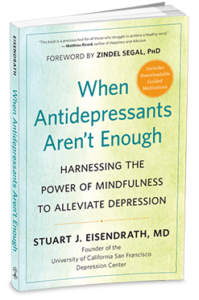Research indicates that MBCT can produce powerful relapse prevention.
In studies comparing it to treatment as usual (no specific treatment), it was twice as effective in preventing relapse over a one year period. More importantly in a larger study, MBCT was compared to maintenance antidepressant treatment, the most common approach to relapse prevention. In this study, participants who had fully recovered from depression with antidepressants were divided into two groups. One group continued with maintenance antidepressants. The other group completed MBCT and then tapered off of antidepressants. The study found that both groups had similar effects–i.e. MBCT was at least as good as continuing antidepressants. In fact, there was some evidence to suggest that greater severity of depressive symptoms prior to treatment was associated with even less relapse with MBCT compared with antidepressants
These studies indicate that the techniques of MBCT such as focusing attention, decentering (distancing yourself) from negative thoughts and feelings, and being compassionate towards yourself can have powerful effects in preventing depression and limiting its impact when it does recur. In depression, there is a downward spiral where depression generates negative thoughts that in turn generate more of the disorder. Mindfulness helps break that cycle by allowing the individual to view their thoughts as just thoughts and not facts. Such thoughts can then be seen as symptoms of depression, just as a fever is a symptom of an infection. Viewing thoughts in this way takes the force out of them and helps the person to respond skillfully to the situation rather than reacting.
